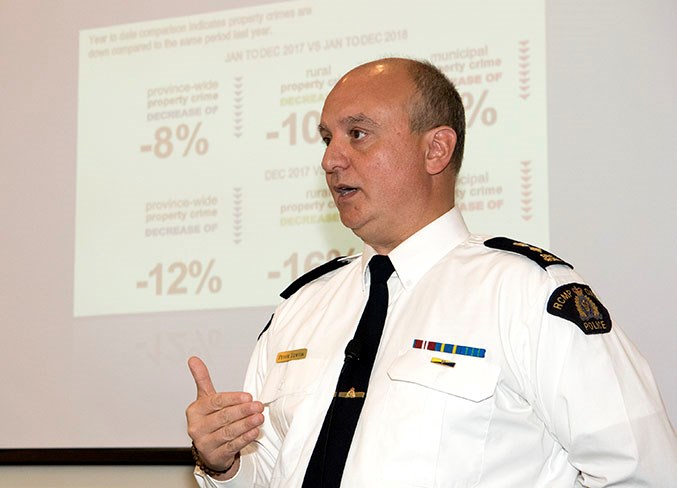Alberta’s cops are making a dent in rural crime, says an RCMP superintendent, but they need backup from country residents if they are to catch more crooks.
That was RCMP superintendent Peter Tewfik’s message to the 200-plus farmers during a standing-room-only session at the Edmonton Expo Centre last week. Based out of K-Division headquarters in Edmonton, Tewfik is the cop heading up Alberta’s crime-reduction strategy, and was at the FarmTech 2019 conference to talk about rural crime.
Tewfik said Alberta had the third-highest rate of rural crime in Canada, and noted how that crime rate rose each year from 2015 to 2017 after almost eight years of decline.
As part of the $10-million rural crime strategy the province announced last year, the RCMP have taken an intelligence-based approach to crack down on country crooks, Tewfik said.
“We have to be smart with the resources we have, and we have to direct those resources to where we have the biggest problems.”
In addition to close work with rural crime watch groups and bylaw officers, the RCMP are using crime stats to find hot-spots for their cops to stamp out, Tewfik said. They're also focusing on prolific offenders – that small percentage of crooks who commit most of Canada’s crimes – through a dedicated group of officers and analysts who chase and catch these criminals across divisions.
“They’re kind of like Dog the Bounty Hunter,” he said, in reference to the popular TV show.
Last year saw Alberta RCMP arrest some 533 prolific offenders and charge them with about 1,628 offences – about four per arrest, Tewfik said. The RCMP were also working more closely with social workers to keep these crooks from re-offending when they get out of jail.
They’re also using labour-saving technologies. Automatic plate scanners let officers find stolen cars fast, while the PROS Data Centre (a dictation service test-driven at the Morinville detachment last summer) is helping cops spend more time patrolling and less time writing reports, Tewfik said.
“It takes the member three minutes (to do) what would have taken him 40 minutes previously,” he said of the latter.
Blair Elliot, who farms south of Lloydminster and once chased a crook who stole his vehicle, said the biggest problem rural residents have with crime is police response times, with many having to wait 20 minutes or more for help.
“That’s the most frustration: not enough police officers."
Tewfik acknowledged rural residents typically have to wait 20 minutes before they see a cop, as police are often busy with other high-priority calls. You’ll get the closest car available if your life is at risk. If the cops are too slow, tell your detachment commander and/or his boss about it so they can fix the problem.
“Give us an opportunity to get it right,” he said.
Tewfik urged residents not to confront thieves, as they could be dangerous, nor to chase them, as that puts everyone at risk. Whole families have been killed during high-speed chases by the police, he noted.
Residents cannot legally use lethal force to defend property but can in some circumstances use it to defend themselves, he continued – expect a police investigation if you do, though.
Tewfik said efforts so far seem to be working. Property crime was down eight per cent province-wide last year and 10 per cent in rural areas, with 480 fewer break-ins and 1,257 fewer cars stolen province-wide.
Tewfik encouraged residents to report crimes when they happened so commanders would know where to deploy officers.
Elliott said it would help if the cops called you back with an update when you reported crimes so you could know your efforts had helped. Tewfik said the RCMP had set up a dedicated call-back unit to do just that.
He also advised residents to join their local crime watch group and take basic crime prevention steps like locking their doors, recording serial numbers and not advertising on social media that they’re leaving on vacation.
“Community safety is all our responsibility.”




